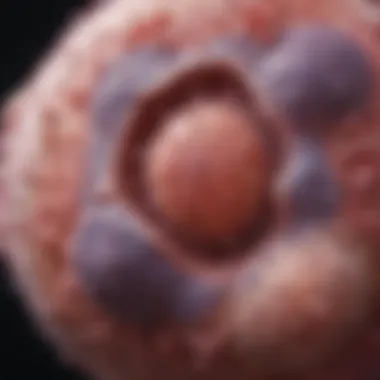Transitional Cell Kidney Cancer: An In-Depth Analysis


Intro
Transitional cell kidney cancer is a specific subtype of renal cancer. It arises from the transitional cells that line the renal pelvis and urinary tract. This form of cancer is also known as urothelial carcinoma. Understanding the intricacies of transitional cell kidney cancer is vital for both healthcare professionals and patients.
The diagnosis and treatment landscape for renal cancer has evolved. Improved research methodologies and innovative treatments have changed outcomes significantly. However, knowledge gaps still exist, especially about its pathogenesis and clinical behavior. This article aims to provide an extensive overview of transitional cell kidney cancer by exploring its etiology, risk factors, and clinical management strategies.
The significance of this topic cannot be overstated. An improved understanding of transitional cell kidney cancer equips clinicians with the necessary tools for better patient management. Furthermore, it offers insights into preventing this disease and developing effective therapies.
Research Overview
Methodological Approaches
The study of transitional cell kidney cancer employs various methodological approaches. These include retrospective analyses and prospective clinical trials. Current studies are increasingly using molecular biology techniques to elucidate the genetics of the cancer. These methods provide deeper insights into tumor behavior and responses to treatment.
Additionally, systematic reviews of existing literature help in assessing trends and gaps in knowledge. They analyze large datasets to evaluate the clinical outcomes of different treatment modalities. This data-driven approach enhances the ability to personalize treatment protocols for patients, thereby improving prognosis.
Significance and Implications
The findings from recent studies have critical implications for patient care. Understanding the risk factors and biology of transitional cell kidney cancer can aid in early diagnosis. This can lead to timely interventions which significantly improve survival rates. Furthermore, the application of new treatment strategies like immunotherapy is showing promise in advanced cases, altering the traditional management approaches.
"The integration of molecular profiling into clinical practice holds the potential to revolutionize our approach to transitional cell kidney cancer."
Current Trends in Science
Innovative Techniques and Tools
Recent advancements in imaging and diagnostic technologies have transformed the management of transitional cell kidney cancer. Techniques such as magnetic resonance imaging and computed tomography allow for earlier detection and more accurate staging of the disease. Moreover, the utilization of liquid biopsies is emerging as a potential non-invasive strategy to monitor tumor dynamics.
Interdisciplinary Connections
The fight against transitional cell kidney cancer involves an interdisciplinary approach. Oncologists, radiologists, and pathologists work closely together to offer comprehensive care. Furthermore, collaboration between researchers in fields such as genomics and treatment development is crucial. This synergistic effort enhances not only understanding but also the effectiveness of interventions at various stages of the disease.
Prelims to Transitional Cell Kidney Cancer
Transitional cell kidney cancer, also known scientifically as urothelial carcinoma of the renal pelvis, is an important topic in the field of oncology. Understanding this disease is essential for several reasons. First, kidney cancer represents a significant portion of the overall cancer burden worldwide. Transitional cell carcinoma is unique because it arises from the renal pelvis, an area that plays a crucial role in urinary function.
Furthermore, awareness of transitional cell kidney cancer is vital for early detection and effective treatment. This can heavily influence patient outcomes. The interplay of risk factors, symptoms, and diagnostic methods will be explored within this comprehensive overview.
With advancements in research and treatment options, a thorough understanding is not just pertinent but necessary for educators, students, researchers, and healthcare professionals alike. This introductory section sets the groundwork for the critical discussions that follow, encompassing aspects of etiology, pathology, clinical presentation, and management strategies.
Definition and Overview
Transitional cell kidney cancer refers to malignancies that originate in the transitional cells lining the renal pelvis. These cells are responsible for accommodating urine flow and provide flexibility as the bladder fills. The unique characteristics of these cells enable them to change shape without losing integrity.
In this type of cancer, abnormal proliferation leads to tumors that can invade surrounding tissues. It constitutes a small percentage of all kidney cancers, yet its incidence is rising. Patients with this entity need specific surveillance since the behavior of these tumors can differ from other renal cancers.
Epidemiology
Epidemiological data indicates that transitional cell kidney cancer is more frequent among certain populations. Risk factors include age, gender, and environmental exposures. It tends to be more prevalent in individuals over the age of 60 and reveals a higher incidence in males compared to females.
Factors driving the rise of transitional cell carcinoma may involve exposure to industrial chemicals, smoking, and possible genetic predispositions. Furthermore, studies have indicated a correlation with chronic urinary tract infections and conditions like bladder cancer. These elements collectively highlight the significance of understanding epidemiology when developing strategies to combat this disease.
"Understanding epidemiology can enhance preventative measures and tailored interventions for at-risk populations."
Etiology of Transitional Cell Kidney Cancer
Understanding the etiology of transitional cell kidney cancer is essential for several reasons. First, it allows researchers and healthcare professionals to identify potential risk factors associated with the disease. This understanding can lead to preventative strategies. Moreover, knowing the underlying causes can contribute to more effective treatment options and improve patient outcomes. Therefore, investigating the genetic, environmental, and lifestyle factors that contribute to this cancer type is crucial for both educational and clinical settings.
Genetic Factors
Genetic factors play a significant role in the development of transitional cell kidney cancer. Some individuals may have a hereditary predisposition due to mutations that influence cell growth and division. For instance, changes in genes like TP53 often correlate with various cancer types, including transitional cell carcinoma. Research shows that people with a family history of kidney and bladder cancers may possess genetic variations that heighten their risk.
Moreover, certain syndromes, such as Lynch syndrome, have also been linked to higher probabilities of developing transitional cell kidney cancer. Genetic testing can help identify these mutations, thereby assisting in risk assessment and early detection strategies.
Environmental Influences
Environmental factors contribute to the etiology of transitional cell kidney cancer. Exposure to various chemicals is significant. For example, occupational exposure to substances like aromatic amines, which are found in dyes, has been associated with an increased risk. Additionally, heavy metals such as cadmium and environmental pollutants may wear down cellular structures, increasing cancer risk.
Furthermore, regions with higher levels of certain environmental toxins sometimes report increased incidences of this type of cancer. Therefore, environmental assessments are critical in understanding how these exposures affect the incidence of transitional cell kidney cancer and can provide valuable insight into prevention.
Lifestyle Choices
Lifestyle choices significantly influence the risk of developing transitional cell kidney cancer. Tobacco use is one of the most prominent factors, with smokers facing a much higher risk than non-smokers. The carcinogens present in tobacco can lead to both bladder and kidney cancers, fostering a concerning link between smoking and these diseases.
Additionally, poor dietary habits, sedentary lifestyles, and obesity can compound the risk. Diets high in processed foods and low in fruits and vegetables can increase inflammation and oxidative stress, further inhibiting the body's ability to fight off cancerous cells. Making healthier lifestyle choices not only helps mitigate these risks but also promotes overall well-being.
"Adopting healthier habits may significantly lower the chances of developing transitional cell kidney cancer."
In summary, the etiology of transitional cell kidney cancer encompasses a range of genetic, environmental, and lifestyle factors. Understanding these elements can enhance preventive measures and inform treatment plans, contributing to better health outcomes for patients.


Pathology of Transitional Cell Kidney Cancer
The pathology of transitional cell kidney cancer is crucial for understanding the disease's progression and potential treatment options. It encompasses the study of the tumor's characteristics and behavior. By examining this aspect, one gains insight on how to classify tumors, predict outcomes, and devise effective therapeutic strategies. Pathology helps differentiate transitional cell carcinoma from other renal cancers, which can influence management and prognosis. This section focuses on two main areas: histological characteristics and tumor staging.
Histological Characteristics
Histological characteristics provide vital information about the cellular structure of transitional cell kidney cancer. This type of cancer usually arises from the urothelium, the tissue lining the bladder and parts of the urinary tract, and its cellular abnormalities can be indicative of malignancy.
Key characteristics to note include:
- Cellularity: Increased cell density is often observed.
- Pleomorphism: Cells exhibit variation in size and shape.
- Nuclear Features: Enlarged nuclei with coarse chromatin patterns can indicate aggressive behavior.
- Mitotic Activity: Increased mitotic figures signify a higher growth rate and poor prognosis.
Understanding these histological traits is essential for diagnosis, as well as for deciding treatment pathways. Moreover, these characteristics play a role in determining the tumor grade, which stratifies patients according to their risk.
Tumor Staging
Tumor staging is a systematic method used to categorize the cancer based on its size, local extension, and whether it has metastasized. The American Joint Committee on Cancer (AJCC) system is often used for staging transitional cell kidney cancer. This classification influences treatment decisions and prognosis.
The stages are as follows:
- Stage I: Tumor confined to the kidney with no invasion into surrounding tissues.
- Stage II: Tumor invades the perinephric tissue but is still confined to the kidney's surroundings.
- Stage III: Tumor extends beyond the kidney and may involve nearby lymph nodes but no distant spread has been observed.
- Stage IV: Distant metastasis has occurred, significantly worsening the prognosis.
Proper staging is critical for evaluating treatment effectiveness and adjusting approaches as necessary.
This structured approach enables clinicians to forecast patient outcomes more accurately. It also guides research efforts aimed at developing novel therapeutic approaches targeting specific tumor characteristics at different stages.
Risk Factors Associated with Transitional Cell Kidney Cancer
Understanding the risk factors associated with transitional cell kidney cancer is crucial for both prevention and early detection. Identifying these risks helps inform potential screening strategies and lifestyle modifications that can reduce incidence. This section will explore several key risk factors, including age and gender disparities, tobacco use, chemical exposures, and obesity coupled with metabolic syndrome. Recognizing these factors allows researchers and healthcare providers to pinpoint at-risk populations and implement targeted interventions.
Age and Gender Disparities
Transitional cell kidney cancer shows significant disparities in incidence based on age and gender. The risk of developing this cancer increases with age, particularly for individuals over the age of 60. Men are statistically more likely to be diagnosed than women.
- Approximately 70% of cases occur in men, indicating a potential biological or environmental factor that may contribute to this disparity.
- Older adults typically have prolonged exposure to various risk factors, which may explain the increasing incidences in this demographic.
Studies suggest that hormonal influences might play a role in gender differences in transitional cell kidney cancer risk.
Tobacco Use
Tobacco consumption is a well-established risk factor for many cancers, including transitional cell kidney cancer. The relationship between smoking and this type of cancer is supported by numerous epidemiological studies.
- Smokers have a significantly higher risk of developing transitional cell cancer compared to non-smokers.
- Quitting smoking can lead to a substantial reduction in risk over time, emphasizing the importance of cessation programs.
The carcinogenic compounds present in tobacco smoke can potentially cause genetic alterations within the cells of the urinary system, thereby increasing cancer risk.
Chemical Exposures
Occupational and environmental exposures to certain chemicals have been linked to an increased risk of transitional cell kidney cancer. This includes exposure to harmful substances such as:
- Arsenic: Common in contaminated water, especially in developing regions.
- Benzidine: This chemical is often found in dyes and can lead to higher cancer rates in workers in related industries.
- Polycyclic aromatic hydrocarbons (PAHs): Found in coal tar and other fossil fuels, these substances have shown potential carcinogenic effects.
Awareness of these chemicals and regulatory measures can play a crucial role in reducing exposure and potential cancer risk.
Obesity and Metabolic Syndrome
Obesity is rising globally and is correlated with several types of cancer, including transitional cell kidney cancer. Obesity leads to metabolic syndrome, which is characterized by hypertension, dyslipidemia, and insulin resistance.
- Research indicates that individuals with metabolic syndrome may have an elevated risk of cancers, including the transitional cell type.
- Weight management and a healthy lifestyle can be key strategies in reducing cancer risk.
Maintaining a balanced diet and regular physical activity may help mitigate some of these risks associated with obesity.
These factors together provide valuable insights into how transitional cell kidney cancer can be better understood and possibly prevented. Speaking to healthcare providers about personal risk factors is essential for appropriate monitoring and early intervention. This comprehensive understanding can lead to better outcomes for those at risk.
Clinical Presentation
The clinical presentation of transitional cell kidney cancer is a crucial aspect of understanding this disease. Recognizing the symptoms early can have a significant impact on diagnosis, treatment, and overall prognosis. In clinical settings, healthcare providers often rely on the patient’s presentation to guide subsequent tests and interventions. The clinical presentation serves as a bridge between initial suspicion and concrete diagnosis.
Common Symptoms
Transitional cell kidney cancer may manifest through various symptoms. Early awareness of these symptoms can facilitate timely medical attention. Some common ones include:
- Hematuria: Notable red or dark colored urine is often the most prominent symptom. It reflects the presence of blood and is generally a reason for patients to seek medical help.
- Flank Pain: Persistent pain in the lower back or side can signify tumor growth or obstruction.
- Weight Loss: Unexplained weight loss can be an indicator of various medical conditions, including cancer.
- Fatigue: Patients may experience a general sense of tiredness, which can often be overlooked but is significant in this context.
- Changes in Urination: This may include increased frequency, urgency, or difficulty in urination.
Each symptom carries essential information. They not only suggest transitional cell kidney cancer but also indicate the stage at which the disease may be present.
Advanced Disease Indicators
When transitional cell kidney cancer progresses, additional symptoms may surface, indicating advanced disease. Recognizing these signs is vital for appropriate intervention. Key advanced indicators include:


- Bony Pain: This can arise from metastasis to bone, leading to discomfort in affected areas.
- Swelling in Limbs: Often caused by lymphatic obstruction, signaling possible advanced complications.
- Changes in Appetite: A noticeable decline in appetite can suggest systemic impacts of cancer.
- Jaundice: Yellowing of the skin and eyes might indicate liver involvement or mass effects.
Advanced symptoms highlight the necessity of regular monitoring for at-risk individuals. Health professionals must remain vigilant in assessing these indicators as they can mark a shift in treatment strategy.
Understanding both common and advanced symptoms enhances awareness about transitional cell kidney cancer. It promotes proactive healthcare seeking behavior, which is fundamental for better patient outcomes.
Diagnostic Procedures
Diagnostic procedures are crucial in establishing the presence of transitional cell kidney cancer. Accurate diagnosis is necessary not only for the confirmation of the disease but also for determining the most effective treatment options. The use of various diagnostic methods allows healthcare professionals to evaluate the extent of cancer, its staging, and overall health of the kidneys. This section covers two key diagnostic approaches: imaging techniques and biopsy/histopathological analysis.
Imaging Techniques
Imaging techniques serve as the primary tools for detecting abnormalities in the kidneys. Common imaging modalities include:
- Ultrasound: This is a non-invasive technique that uses sound waves to create images of the kidney. It is often the first step in kidney cancer evaluation, as it helps to identify masses or structural changes.
- Computed Tomography (CT) Scans: CT scans provide more detailed images than ultrasounds and are essential for staging cancer. They can identify the size, shape, and spread of tumors.
- Magnetic Resonance Imaging (MRI): This technique is useful especially when there are concerns about the surrounding soft tissues, such as the liver or lymph nodes. MRI offers a different imaging perspective and helps in detailed assessment.
The choice of imaging modality often depends on a range of factors, including the patient's medical history and the initial findings. Each imaging technique has its advantages, and they can sometimes be used in conjunction to enhance diagnostic accuracy. For instance, a CT scan might be followed by an MRI to confirm findings.
Biopsy and Histopathological Analysis
While imaging techniques are excellent at detecting tumor presence, a definitive diagnosis often requires a biopsy. During a biopsy, tissue samples are taken from the tumor, allowing pathologists to examine the cells under a microscope. There are different techniques for obtaining these samples:
- Percutaneous Needle Biopsy: This minimally invasive procedure involves inserting a needle through the skin to collect a sample. It is guided by imaging techniques to ensure accuracy.
- Surgical Biopsy: In some cases, such as when larger samples are needed, a surgical approach may be necessary. This method allows for a comprehensive evaluation of the tumor and surrounding tissue.
Histopathological analysis of the biopsy tissue provides insights into the tumor's characteristics. Pathologists can classify the cancer type, assess cell structures, and determine the grade, which informs the aggressiveness of the disease. This information is vital for developing a tailored treatment plan.
The integration of imaging and biopsy results leads to a comprehensive understanding of the patient's condition. As such, it helps guide the subsequent steps in management and therapy options, ultimately influencing patient outcomes.
"Accurate diagnosis through advanced imaging and tissue analysis is vital for effective management of transitional cell kidney cancer." - Medical Expert
Understanding these diagnostic procedures enhances awareness of how critical early and accurate diagnosis is in transitioning effectively to treatment options.
Treatment Options for Transitional Cell Kidney Cancer
Understanding the treatment options for transitional cell kidney cancer is crucial for patients and healthcare professionals alike. This section will explore the various methods available to manage and treat this type of cancer. The approaches range from surgical interventions to advanced therapies. Each method plays a specific role in improving outcomes, alleviating symptoms, and enhancing the quality of life. By examining these treatment modalities, we can gain insight into their rationale and effectiveness in addressing transitional cell kidney cancer.
Surgical Interventions
Surgery is often the first line of treatment for transitional cell kidney cancer. Surgical options may vary depending on the stage of the cancer and the overall health of the patient. The main objectives of surgical treatment include removing the tumor and, if necessary, parts of the kidney.
The various surgical procedures include:
- Radical Nephrectomy: This involves the complete removal of the affected kidney along with surrounding tissues and lymph nodes. It is often recommended for localized tumors.
- Partial Nephrectomy: In cases where the tumor is smaller or located in a way that allows it, only the tumor and a margin of normal tissue are removed. This method aims to preserve kidney function.
- Transurethral Resection: In early cases, this may be used to remove tumors from the bladder or kidney directly, using a scope.
Each surgical approach has its considerations, including potential complications and recovery time. Individual patient factors will influence the choice of surgical technique. Patients should discuss these options in detail with their healthcare teams to make informed decisions.
Chemotherapy Protocols
Chemotherapy is usually considered when cancer has spread beyond the kidney or is at risk of recurrence. This treatment involves using drugs to kill or slow the growth of cancer cells.
- Traditional Chemotherapy: Drugs such as cisplatin and gemcitabine have been commonly used, often in combination. It is essential to monitor for side effects, which may include nausea, fatigue, and changes in blood counts.
- Adjuvant Chemotherapy: This is administered after surgery to eliminate residual cancer cells and reduce the risk of recurrence. The effectiveness of chemotherapy varies among patients and requires careful assessment.
The approach to chemotherapy should be personalized, based on the individual's specific situation. Discussions about potential benefits, side effects, and the overall treatment plan are vital.
Targeted Therapies
Targeted therapies have emerged as essential tools in treating transitional cell kidney cancer. These therapies focus on specific characteristics of cancer cells, thus maximizing efficiency and minimizing exposure to normal cells.
- Tyrosine Kinase Inhibitors: Drugs like sunitinib and pazopanib target specific pathways involved in cancer growth and are used in advanced stages of the disease.
- VEGF Inhibitors: Agents such as bevacizumab block vascular endothelial growth factor, restricting blood supply to tumors.
The advancement of targeted therapies has shown promising results, but not all patients are suitable candidates. Genetic markers and tumor characteristics are considered for effective application.
Immunotherapy Advances
Immunotherapy has revolutionized the treatment landscape for various cancers, including transitional cell kidney cancer. These therapies leverage the body's immune system to fight cancer.
- Checkpoint Inhibitors: Drugs like pembrolizumab and nivolumab enhance the immune response against cancer cells. These agents have shown effectiveness in advanced stages of transitional cell kidney cancer and are often used when other treatments fail.
- Combination Treatments: Research is ongoing to determine the best ways to combine immunotherapies with other modalities to improve outcomes further.
Immunotherapy comes with its own set of potential side effects, often related to over-activation of the immune system. Patients receiving these drugs require close monitoring.
Overall, selecting the appropriate treatment requires a comprehensive evaluation and a tailored approach based on individual patient factors, cancer characteristics, and patient goals.
Each treatment option should be discussed in detail with healthcare providers to ensure the best possible outcomes.
Prognosis and Survival Rates
Understanding the prognosis and survival rates in transitional cell kidney cancer is critical for patients, families, and healthcare providers. These factors contribute to treatment decision-making and provide insights into future health outcomes. Prognosis essentially refers to the likely course of the disease, while survival rates indicate the percentage of patients who are expected to live for a specific period after diagnosis. Knowing this information helps to shape expectations about treatment effectiveness and overall quality of life.
Factors Influencing Prognosis


Several elements can influence the prognosis of patients with transitional cell kidney cancer. These include:
- Tumor Stage: The stage at which the cancer is detected plays a significant role. Early-stage cancers generally have better outcomes than those that are more advanced.
- Histological Grade: Higher grades are associated with more aggressive tumors and poorer prognosis. Grading assesses how much the cancer cells differ from normal cells.
- Patient's General Health: A patient’s overall health, fitness level, and existing medical conditions can affect survival. Healthier patients often respond better to treatments.
- Age and Gender: Age can influence outcomes, with younger patients typically having better prognoses. Gender differences may also affect survival rates.
- Response to Treatment: How well a patient responds to initial treatments can provide clues about long-term outcomes.
Each of these factors offers vital information that can help guide treatment plans and expectations for survival.
Statistical Analysis of Survival Rates
Analyzing survival rates for transitional cell kidney cancer involves examining large groups of patients over time. Studies provide estimates that indicate how many patients survive for one, five, or ten years after diagnosis. The typical findings include:
- Five-Year Survival Rate: The five-year survival rate generally varies based on stage. For localized tumors, rates can reach up to 80-90%.
- Regional and Distant Spread: If cancer has spread to nearby tissues, the five-year survival rate drops significantly, potentially between 30-50%. For distant metastasis, survival rates can decline further to around 10-15%.
These statistics can provide a general sense of what to expect, but individual outcomes can differ widely based on numerous factors.
Understanding prognosis and survival statistics should be approached with caution. They offer valuable insights but cannot predict individual outcomes for every patient.
By scrutinizing both the factors that influence prognosis and the statistical survival rates, patients and their families can make more informed decisions regarding treatment options and can more effectively navigate the complex landscape of transitional cell kidney cancer.
Recent Research and Developments
The field of transitional cell kidney cancer is continuously evolving, with significant advancements in our understanding of the disease. Recent research is pivotal as it brings fresh insights into diagnosis, treatment options, and the overall management of transitional cell kidney cancer. This sector involves a multifaceted approach combining genetic research, clinical trials, and innovative treatment methodologies that can address the complexities of the disease effectively.
Breakthroughs in Treatment Modalities
Emerging treatment modalities are essential in enhancing the outcomes for patients with transitional cell kidney cancer. One notable development is the rise of personalized medicine. This approach seeks to tailor treatment based on the individual genetic profile of tumors. Studies have shown that targeted therapies such as Atezolizumab and Nivolumab can be effective, especially for patients with advanced stages of the disease. These therapies function by harnessing the body’s immune system to combat cancer cells, showing a marked improvement in survival rates compared to traditional methods.
Additionally, combination therapies are gaining traction. Research indicates that using a combination of immunotherapy with chemotherapy has resulted in more efficient tumor reduction.
"Targeted therapies mark a pivotal shift in the management of transitional cell kidney cancer, offering hope for improved survival rates and quality of life."
Other advancements include the development of new delivery systems that increase treatment efficacy while reducing side effects. Nanotechnology is currently a developing area, promising to enhance drug delivery directly to tumor sites.
Ongoing Clinical Trials
Clinical trials play an important role in evolving treatments for transitional cell kidney cancer. Various ongoing studies are investigating novel therapies, aiming to establish more effective management strategies. Notable trials focus on combinations of existing therapies and completely new approaches such as CAR T-cell therapy and gene editing technologies.
Several key clinical trials are providing data about how various treatment combinations affect patient outcomes:
- Trials assessing the efficacy of Atezolizumab combined with chemotherapy in increasing response rates.
- Studies exploring the use of Radium-223, aimed at understanding its impact on patients with metastatic transitional cell kidney cancer.
- Trials focusing on the safety and efficacy of new immunotherapeutic agents that target specific biomarkers associated with transitional cell cancers.
These research efforts are crucial for determining the best course of action for patients and potentially setting new standards of care in the future. Engaging in clinical trials not only helps in advancing medicine but also offers patients access to cutting-edge therapies. As research continues, it is expected that more comprehensive treatment protocols will emerge, benefiting those affected by transitional cell kidney cancer.
Living with Transitional Cell Kidney Cancer
Living with transitional cell kidney cancer involves navigating a complex landscape of medical, emotional, and social challenges. The significance of this topic arises from the multifaceted nature of cancer treatment and the consequential impact on a patient’s quality of life. Patients often face distressing physical symptoms, complicated treatment regimens, and varied emotional responses.
Understanding how to live with this condition requires recognizing the importance of support systems. Access to resources can make a difference in the day-to-day experiences of individuals diagnosed with transitional cell kidney cancer. This section will elucidate support networks, available resources, and the psychosocial implications of living with this illness.
Support Systems and Resources
Establishing strong support systems is crucial for individuals with transitional cell kidney cancer. Support can come from various sources, including family, friends, healthcare providers, and external organizations.
- Family and Friends: Emotional encouragement from close relationships can ease the burden of the diagnosis. Frequent communication and shared activities can reinforce connection.
- Healthcare Team: Oncologists, nurses, and social workers are vital in providing not just medical treatment but also emotional support. Regular appointments can ensure timely adjustments to care plans.
- Patient Support Groups: Engaging with groups such as the American Cancer Society can provide a safe space to share experiences and lend support among peers facing similar circumstances. These groups often host meetings that can offer an environment for openness and understanding.
- Online Platforms: Resources like forums on Reddit or Facebook groups enable connection with a wider community, where patients can ask questions, share coping strategies, and learn from others’ experiences.
- Educational Materials: Organizations provide literature that helps patients grasp their condition better. These materials can range from pamphlets about the disease to detailed guides on treatment options and coping mechanisms.
"Support is not just about treatment but also about being heard and understood."
Accessing these resources can help in improving the overall outlook and empowerment of individuals facing this diagnosis.
Psychosocial Impact
The psychosocial impact of living with transitional cell kidney cancer cannot be understated. The diagnosis brings a spectrum of emotional challenges, from anxiety and depression to fear about the future. Each patient’s experience is unique, influenced by personal circumstances, support availability, and coping skills.
- Anxiety and Depression: Post-diagnosis, patients may experience heightened anxiety about treatment outcomes, and life changes. Professional mental health support can be beneficial in addressing these concerns.
- Fear of Recurrence: Many individuals grapple with the fear of cancer returning after initial treatment. This ongoing anxiety can impact daily life and relationships.
- Coping Strategies: Developing healthy mechanisms for coping is essential. Techniques such as mindfulness meditation, journaling, and exploring creative outlets can provide emotional relief.
- Changes in Identity: A cancer diagnosis often leads to an adjustment in identity. Patients may find themselves re-evaluating life goals and priorities, which can lead to profound personal growth or conflict.
- External Stigma: Misconceptions about cancer can sometimes lead to stigmatization. Awareness and education are vital to combat such attitudes, fostering a more supportive environment.
Living with transitional cell kidney cancer entails addressing not just the physical but also the emotional needs of patients. Providing comprehensive support and understanding can facilitate a more manageable journey through treatment and recovery.
Finale
The conclusion of this article serves as a pivotal summarization of transitional cell kidney cancer, encapsulating crucial insights into its complexities. It reflects on the key aspects discussed throughout the article, reinforcing the significance of understanding this particular subtype of kidney cancer. As transitional cell kidney cancer affects the renal pelvis and ureter, being informed about it is essential for both patients and healthcare providers alike.
Key Takeaways
In reviewing the content, certain key points emerge:
- Epidemiological Significance: Transitional cell kidney cancer is not as common as other forms of kidney cancer, but its unique characteristics and treatment responses require specific attention.
- Risk Factor Awareness: Factors such as tobacco use, obesity, and certain chemical exposures amplify the risk, making lifestyle choices a critical area for preventive measures.
- Treatment Diversity: The various treatment modalities available highlight the importance of a personalized approach, as individuals may respond differently to surgery, chemotherapy, or immunotherapy.
Understanding these essential elements enhances the ability of both patients and practitioners to approach the disease more effectively.
Future Directions in Research
Research surrounding transitional cell kidney cancer is ever-evolving and presents exciting opportunities. In the future, we can expect several directions to emerge:
- Genomic Studies: Ongoing exploration into the genetic facets of transitional cell kidney cancer may unveil new biomarkers for better diagnosis and treatment.
- Novel Therapeutics: Innovations in targeted therapies and immunotherapies could yield more effective treatment options, potentially improving survival rates for affected individuals.
- Patient-Centered Approaches: Understanding the psychosocial implications of living with this cancer allows for more comprehensive care strategies, focusing on the well-being of patients alongside their physical health.
Continued research and clinical trials will reshape the landscape of how we understand and treat transitional cell kidney cancer, pushing forward toward better outcomes for patients.



